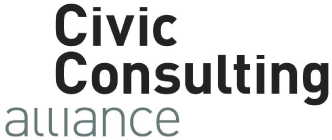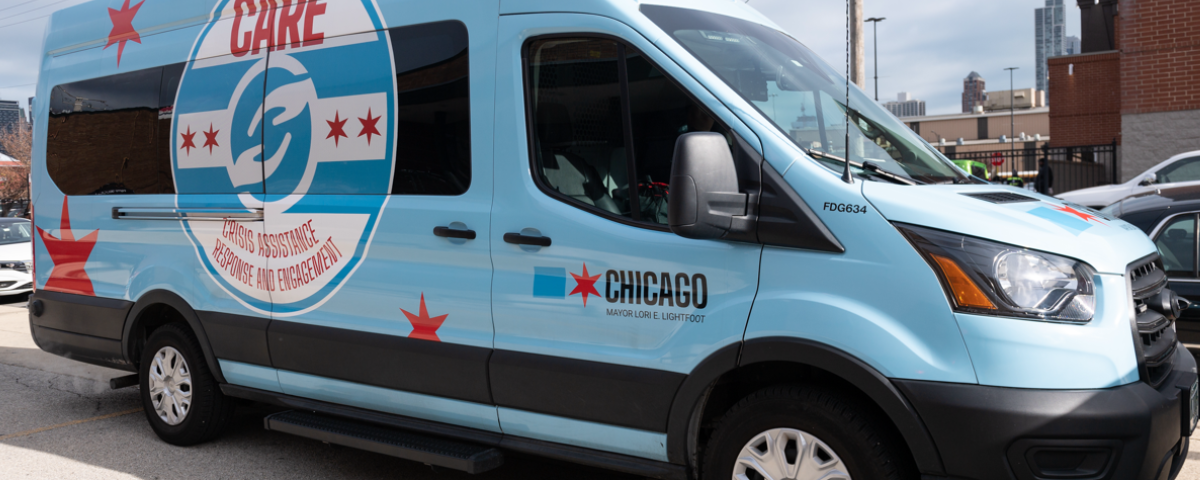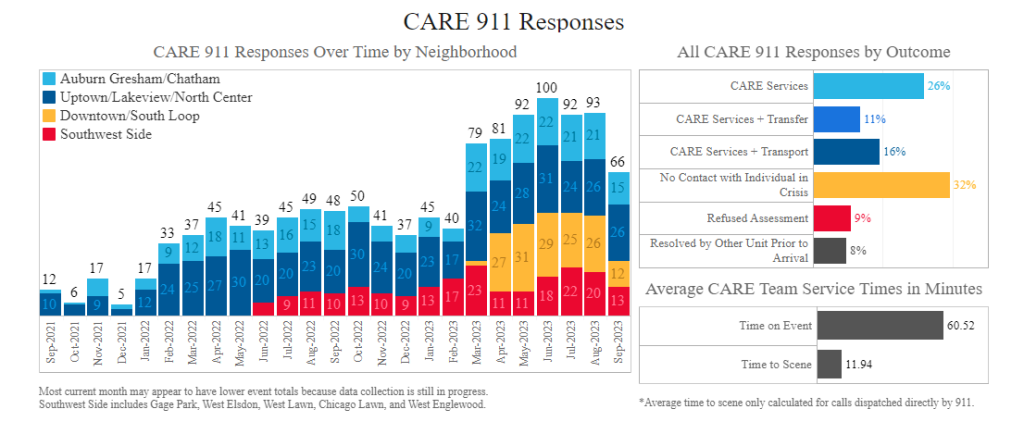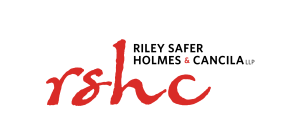
Doubling the reach of Chicago’s mental health crisis response program

Plan of Action for Regional Transit: A collaborative effort to reform our transit system
December 18, 2023
Closing opportunity gaps for Black CPS students
May 30, 2024Doubling the reach of Chicago’s mental health crisis response program

Civic Consulting Alliance’s pro bono partners Kearney and Riley Safer Holmes & Cancila provided specialized expertise in legal analysis, labor modeling, and implementation planning that’s helping the City double the geographic reach of its promising mental health crisis response program.
Chicago’s new response model for mental health emergencies
Chicago’s Crisis Assistance Response and Engagement (CARE) program responds to 911 calls involving individuals experiencing a mental health or substance use-related crisis. Each CARE team includes behavioral health professionals who are trained to de-escalate situations, provide mental health assessments, connect individuals with resources, and follow up to address their unmet health and social needs.
CARE is the first program of its kind in Illinois; the first on-the-ground team was launched in September 2021 and since then the City has continued to scale up operations. The initial results are promising: out of over 1,200 calls, less than 1% have resulted in use-of-force incidents or arrests. The Chicago Sun-Times March 2023 article, “Chicago is making progress on a new response for 911 calls involving mental health. Keep at it.” recognized the benefits of CARE, and urged Chicago’s next mayor to continue to support the program.

Early in his tenure, Mayor Brandon Johnson committed to expanding the program for two reasons: alternate response directly supports his “Treatment Not Trauma” policy priority, and the work is an element of his “People’s Plan for Community Safety.” However, to expand CARE, crucial questions needed to be addressed: what resources would be needed (team composition, headcount, budget, etc.), and how could expansion be achieved most effectively? To answer these questions, the Chicago Department of Public Health would need to partner with multiple city departments/agencies, each with their own priorities, perspectives, and labor constraints.
“Building a new workforce across multiple stakeholders is a heavy lift – the CARE program involves five departments, each with distinct priorities, budget constraints, and labor requirements. Civic Consulting Alliance brought pro bono resources with functional expertise that accelerated and facilitated data-driven decision-making. Thanks to their support we are poised to double the footprint of CARE by expanding geographies and into evening and weekend coverage, ensuring this promising model reaches even more of our residents.”
– Matt Richards, Deputy Commissioner of Behavioral Health, Chicago Department of Public Health
Civic Consulting Alliance and partners deliver data to inform decisions and planning
Civic Consulting Alliance provides pro bono management consulting for a variety of community safety initiatives in Chicago, including working with the Chicago Department of Public Health to enhance its violence reduction portfolio and helping Deputy Mayor Garien Gatewood build the “People’s Plan for Community Safety.” Because of our track record of work with CDPH and alignment to the “People’s Plan for Community Safety”, we were well-positioned to support the CARE expansion by bringing in pro bono partner expertise and acting as a neutral facilitator between departments to make sure all voices were heard and represented along the way.
The Mayor’s Office needed a fact base to make a thoughtful budgeting decision about expanding the CARE program. Our pro bono partners provided technical expertise (legal analysis and labor modeling) that were not readily available to our government clients. Partners Kearney and Riley Safer Holmes & Cancila provided a staffing model, and expansion scenarios – including headcount projections, budget projections, and operational feasibility within the parameters of collective bargaining agreements – that were used by the Mayor’s Office to make a policy decision on how the model would scale in 2024.
Based on the Mayor’s policy decisions, our pro bono partner Kearney then developed implementation plans, timelines, and a change management strategy that were heavily informed by stakeholder feedback. Because CARE program staff at CDPH would face changes in their day-to-day operations, Kearney took a listen-first approach with front-line CARE staff to inform the plan to double the footprint of the program in the coming 1-2 years.
Doubling CARE’s geographic footprint where it’s most needed
CARE is the City’s first substantive example of alternate response in action, bringing the response that best meets the needs of a person experiencing a mental health crisis. By doubling the geographic reach of the program and expanding hours to cover evenings and weekends, the City has made a significant step towards scaling CARE citywide.

Most notably, this CARE expansion improves equitable access to compassionate care by prioritizing communities with the greatest need. Our partner Kearney developed a demand-driven labor model by looking at where the greatest need is for services, then proposed those as the expansion districts.
In addition to providing more people in crisis with a healthcare-based response, the CARE model is an example of how City departments like the Chicago Department of Public Health, Chicago Fire Department, Chicago Police Department, and Office of Emergency Management and Communications can develop new and better ways to serve residents, and be more responsive to community needs.
Thank you to our Pro Bono Partners:


